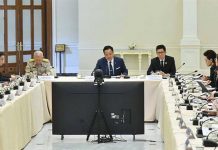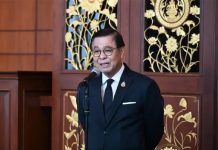
BANGKOK, Thailand – Sirikanya Tansakul, the Deputy Leader of the People’s Party and Member of Parliament, strongly suggested that the government reconsider its plan to borrow 500 billion baht to stimulate the economy. Instead, she proposed that the government revise its budgets for 2025 and 2026 to allocate funds more efficiently and avoid new borrowing.
Sirikanya expressed concern that the government had yet to clarify the source of the 500 billion baht it intends to borrow. Specifically, she noted that the government had not outlined whether the funds would be raised through loans or by reallocating money from existing resources. She mentioned that there had been speculation that part of this funding might come from the 150 billion baht allocated in the 2025 budget for the digital wallet project, which is intended for economic stimulus. If the government plans to use these funds, Sirikanya suggested that it might be possible to reduce the borrowing amount or, ideally, avoid borrowing entirely by adjusting the current budget allocations.
According to Sirikanya, the government could also make use of funds that are already available in the 2025 budget, which is currently under review by the National Assembly. She argued that the 2025 budget should be adjusted to reflect the current economic climate and to provide the government with an additional 50 billion to 100 billion baht, which could be used to stabilize the economy without the need for new debt. Sirikanya further emphasized that if the government were able to reallocate resources in this manner, it could secure up to 300 billion baht, which would be sufficient to address short-term economic challenges, such as those resulting from global trade disruptions or economic slowdowns.
Sirikanya cautioned that borrowing such a large amount without a clear and transparent plan would be ineffective. She recalled previous stimulus measures, such as the 145 billion baht distributed during the pandemic, which had not resulted in the anticipated economic growth. She emphasized that the success of any economic stimulus program depends not only on the amount of money allocated but also on how it is used. Sirikanya highlighted the importance of detailing the specific objectives for the borrowed funds, whether for stimulating consumption or investment, in order to ensure that the measures would lead to meaningful economic growth.
In addition to this, Sirikanya referred to the recent forecast by the International Monetary Fund (IMF), which predicted that Thailand’s economy would only grow by 1.8% in the upcoming year, well below the government’s target of 3%. She pointed out that, according to the IMF, reaching the 3% growth target would require a much larger investment than the 500 billion baht the government had proposed. She noted that the government would need to plan for more comprehensive and targeted spending if it aimed to achieve such ambitious goals, and suggested that the 500 billion baht could only help stabilize the economy at around 2% growth. This, she argued, was a much more realistic target under the current economic conditions.
Additionally, Sirikanya raised concerns about public trust in the government’s handling of finances. Given the historical use of government funds for cash handouts without clear economic results, she urged the government to provide a comprehensive and transparent plan before considering borrowing on such a scale. She stated that the public and opposition parties could only support the government’s borrowing plans if there was a well-defined roadmap for how the funds would be spent to revitalize the economy. (TNA)










